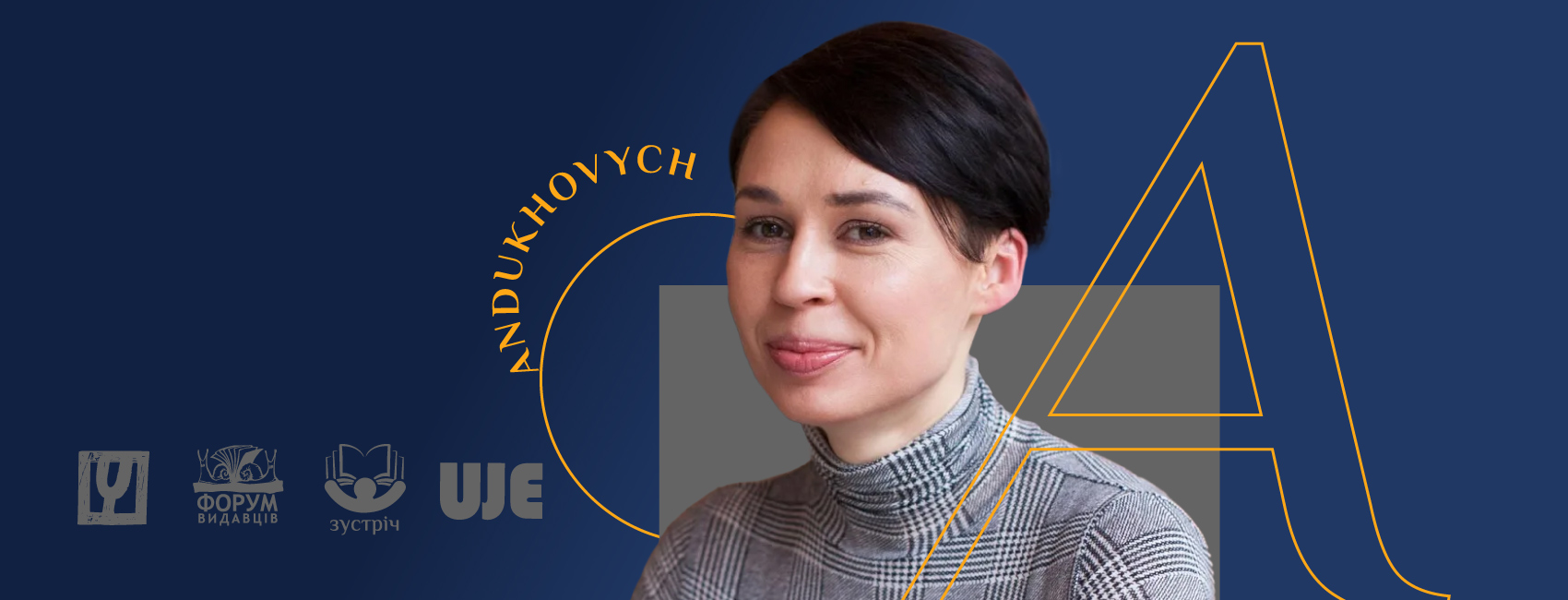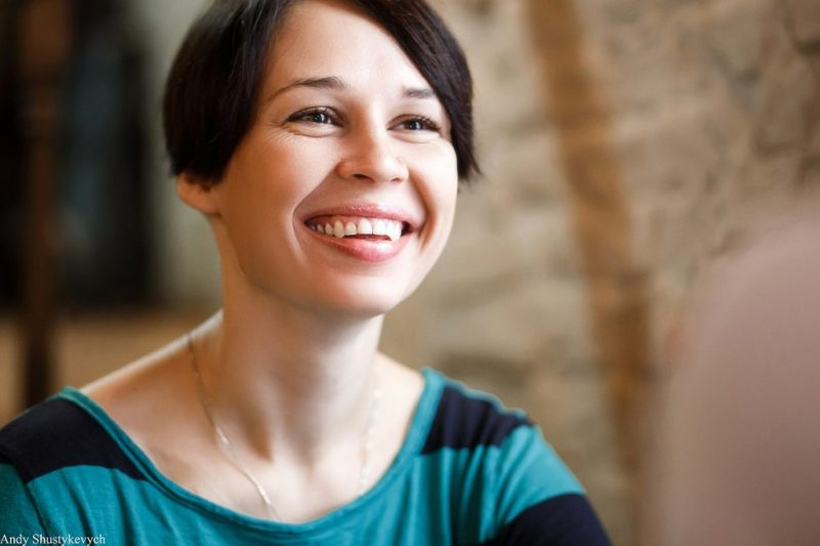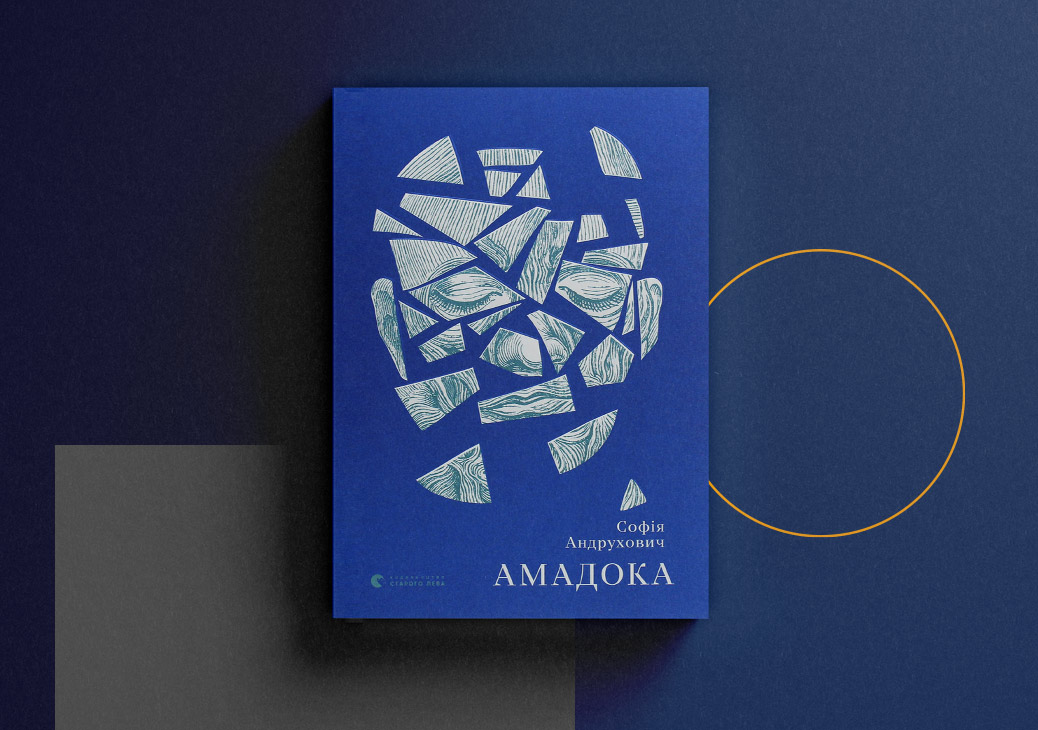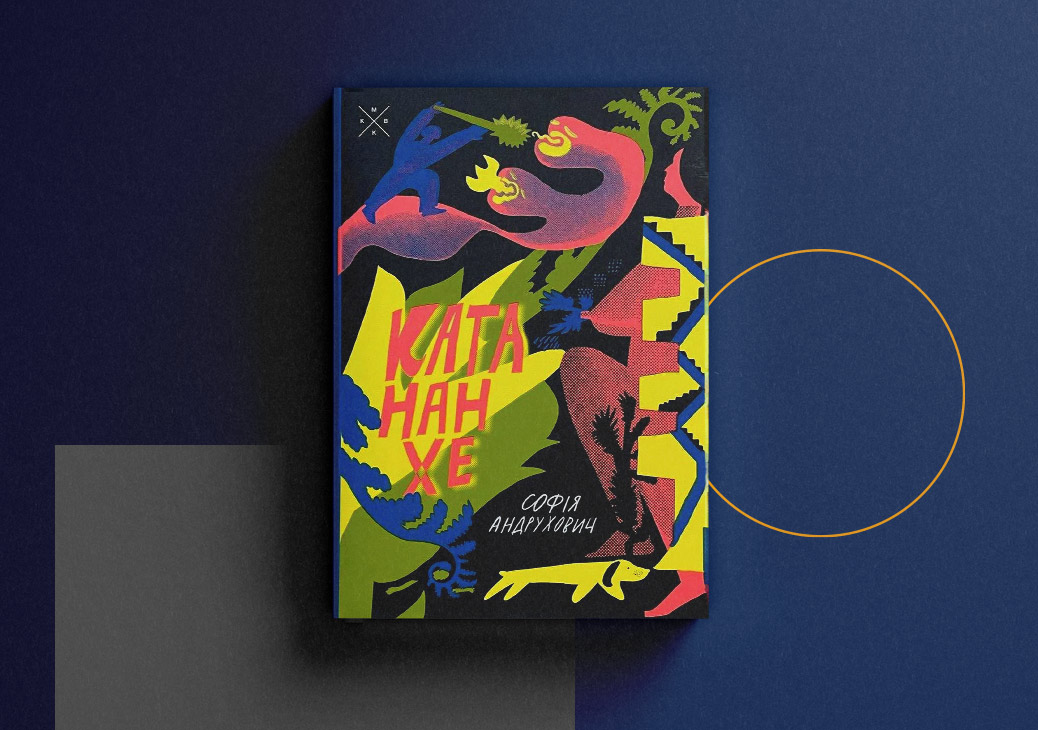Sofia Andrukhovych: to survey a large territory, you need to step back in space, time, and emotion
Originally appeared in Ukrainian @Chytomo
Amadoka is not Sofia Andrukhovych's newest book (she has recently published Catananche), but it is definitely her most voluminous one in terms of the number of pages and ideas. As Ukrainians waited for a "big Ukrainian novel," Andrukhovych was busy crafting over 800 pages of text to combine different historical and cultural layers and reveal invisible links between large-scale tragedies and individual lives. The novel was duly recognized, winning Encounter: The Ukrainian-Jewish Literary Prize in 2023, while its German translation was awarded the Hermann Hesse prize this year. Simon & Schuster, one of the world’s biggest publishers, purchased the rights to bring out the English translation of Amadoka, so the novel continues to find readers far beyond the borders of Ukraine.
In this interview, we discuss Andrukhovych’s work on Amadoka, the importance of personal ties for interethnic understanding, and Ukrainian-Jewish relations.
At the Encounter prize award ceremony, you said you rediscovered Shmuel Yosef Agnon’s oeuvre while at the literary residence in Buchach. I suspect this had an effect on your writing of Amadoka. How do Jewish culture and history topics find their way into your work?
Jewish culture appears in the life of every Ukrainian quite early and in different ways. In my case, the Jewish topic was present from birth because I was born in Ivano-Frankivsk, where, like in any other western Ukrainian city, the traces of Jewish culture are very visible despite the ravages of Soviet times. These traces have always been present in the city’s architecture and its very atmosphere. I also saw them in the stories of my grandparents when they talked about their neighbors whom they had known all their lives. So, it was something natural for me.
However, as a child, you naturally lack the knowledge and awareness to somehow formulate or discern patterns. And then there is the effect of distance: when you are very close to a topic, you may not notice it. We always talk about distance in relation to various phenomena. To survey a large territory, you need to step back in space, time, and emotion. If possible. Something like this has been the case with me and many other Ukrainians. Many of us were born and have lived amidst traces of Jewish culture. Still, for understandable and complicated historical reasons, this topic is not as prominent, articulated, and discussed as it should be.
For me, one of the first moments of profound awareness was coming to Buchach for a literary residence linked to Agnon. At the same time, I approached the Jewish topic earlier while writing Felix Austria: I studied various aspects of how the residents of Stanyslaviv interacted with each other at the turn of the 20th century. I turned it into more of a fantasy story, but it gave rise to this inner need to talk about Ukrainian-Jewish relations more seriously and in greater detail.
When my residence in Buchach started, I became immersed in that lost world. Every day, I met fascinating people, including local historians and artists, and I was given incredible tours. The Jewish presence, i.e., its surviving traces, became very prominent for me. It sharply contrasted with the everyday activities of people living in those houses and walking along those streets. I realized that this story of oblivion is also about me.
So, this was roughly the origin of the need to try and do something on my own level, for myself. I wanted to give this unresolved internal problem at least some shape or form and find the right words within myself.
So, it appears that, besides putting some distance between yourself and your topic, it is sometimes helpful to take a deep dive. For example, you can acquire empathic experience and a sense of connection by visiting the location inhabited by the people you want to write about. In this sense, you didn't limit yourself to Buchach but also went to Israel, a place at the very core of Jewish culture.
Yes, it was an incredible trip, precisely in terms of building this sense of connection. It is generally one of the key feelings worth constantly pursuing. It was vital for me to observe these people in real life. Many of the individuals we met there (or their ancestors, parents, or grandparents) came to Israel from our region, and it was such a wholesome feeling to see the continuation of life. But their life is tough, similar to our current Ukrainian experience. It was, of course, incredible to hear stories about air raid alerts and missile attacks and spend nights in accommodations with a special room functioning as a bomb shelter.
It was crucial for me to come to the Agnon House. We had a meeting with the interested regular visitors there. As we engaged in a warm, friendly conversation, I felt an opening occurred on both sides. It was important for us, people from Ukraine, to talk about what we were going through and how we were discovering Agnon, his works, and his people. I had a feeling that our interlocutors were actually surprised at us, because they had some very theoretical notions about Ukrainians who could truly immerse themselves in Jewishness and Jewish history topics.
Is this conventional image of Ukrainians largely construed by post-Soviet or Russian narratives constantly broadcast abroad? Above all, I mean the historical myths about conflict moments in our common Ukrainian-Jewish history.
This is what I meant when speaking about the surprise I observed. Discussing these feelings with my colleagues and friends, I learned we all had similar impressions. The Israelis were surprised to discover that Ukrainians could be different from what they imagined. They perceived Ukrainians as being, at best, utterly indifferent to Jewish topics. More often than not, they heard about Ukrainians as antisemites, a perception dictated, as you said, by many years of Soviet and now Russian propaganda. A lot of money, time, and effort is poured into it. Meanwhile, Ukraine is not doing much along this line, partly for objective reasons. It is impossible to catch up with the scale of Russian propaganda. Still, there is always an incredible benefit from every personal meeting with an individual and hearing personal stories, no matter how idealistic it may sound. Anyone from Ukraine, with their experience and living language, who can answer people's questions, talk about themselves and their family, and share their thoughts, makes progress by helping undermine and dispel these stereotypes and ideas. I think literature does that, too.
Literature is the first thing that comes to mind when I think about how we can inform the world about the true attitude of Ukrainians toward Jews. Literature often works with memory, cultural codes, and archetypes, which are essential for reaching international understanding. And this is where translation plays a key role. We know that Simon & Schuster, one of the world’s biggest publishers, purchased the rights to publish the English translation of Amadoka. Over 800 pages of Ukrainian text did not scare them at all.
Indeed. This is an interesting story as it also involves a human element, illustrating the importance of personal connections and stories.
Up to a certain point, there was not much progress with Amadoka, although the Old Lion publishing house made considerable efforts to inform foreign publishers about its catalog. Almost all of them balked at Amadoka due to its sheer volume. One exception was Residenz Verlag, an Austrian publishing house that previously brought out Felix Austria. Others hesitated terribly and considered the proposal for a long time without saying either yes or no. Suddenly, I received an email from an American agent, Elianna Kan, who had found my address, contacted me, and suggested we talk online. She was born in the United States, but her roots are in Ukraine, although she has no command of Ukrainian. Her mother is a Ukrainian Jew, who was born in Kyiv and emigrated in the 1960s or 1970s. She is still very interested in everything Ukrainian, constantly asking her friends to bring her the latest books from Ukraine whenever possible.
This lady read Amadoka in Ukrainian, and the novel resonated with her. In it, she found topics linked to her personal history and the history of her people. She conveyed her impressions to Elianna, who was so moved by what she heard that she started researching the author. This way, other publishing houses began to look at Amadoka, and things got off the ground.
Thus, Jews living in different countries and feeling this kind of unity with their small homeland are conduits of Ukrainian culture, bringing it from one environment to another.
This is extremely important, especially when it comes to dispelling stereotypes. I can fantasize and imagine people who have left Ukraine and who have had painful experiences of losing family members. They would also keep various impressions or stories (true or false, we cannot know for sure) about the conduct of their neighbors during the Holocaust. These would often be truly painful stories, unpleasant for us, as they involve eyewitness accounts of crimes or indifference. Part of that pain is not only knowing that your relatives or ancestors died in a horrible, violent way but also having the conviction that the people living next door to your close ones did not help them or, even worse, hurt them and that now their descendants don’t care.
So, this story is a ray of light. There are actually many more such rays — you just need to look closely to see them. Many Ukrainians want to talk about it and have the need to uncover various situations: both painful and unbearable, and those that testify to humanity and willingness to come to the rescue.
The writer, scholar, and spy Viktor Petrov, mentioned in Amadoka, can be viewed as one of such Ukrainians who helped their neighbors. According to a semi-legendary story, he helped save the Karaites from destruction during the Nazi occupation. The Germans wanted to destroy them together with the Jews. Petrov did not take direct action but employed intellectual tricks to convince the Nazis that they were wrong in their views on the Karaites. Why did you decide to write about Petrov in your novel?
It had to do with the neoclassicists [a group of Ukrainian poets active in the 1920s], the 1930s, and Stalinist repressions. This subject troubled me for some time, just like the Holocaust and the Jewish theme. I approached the idea of writing about it in different ways. Initially, I imagined the text as a separate novel based on the love triangle between Petrov, Sofia Zerova, and the Ukrainian professor and poet Mykola Zerov. It would also involve plenty of intrigue and scheming, as Petrov was a double agent serving two empires. He disappeared, moved from one country to another, etc. There are a multitude of questions about who he was and what he did internally to preserve himself. I found it terribly appealing because it was a real human story that showed the period, historical circumstances, everyday life, and human relationships — an entire cross-section of life.
However, I was missing something. I couldn't find the right intonation. The idea of the plot for Amadoka came to me only after the 2014 events: the outbreak of the war in the Donbas, the annexation of the Crimea, the internal shifts I experienced, and the observations I made of people around me.
I realized it was a story of human memory at different levels — how we perceive things, how our psyche works, how we remember, how we tell a story and forget it, and why we do that.
It offered me an opportunity to go deeper and just try to touch upon a few more huge topics — the Holocaust and Stalinist repressions. I saw how I wanted to build the structure.
At the launch of Catananche, you said you wrote Amadoka to prove your ability to produce such texts for readers and perhaps literary critics. Now that Catananche is out, you seem to be returning to something more usual for yourself. What exactly did you mean to say?
I wouldn’t deny making a point before readers and critics, but things like that still come from someplace deep inside. When there is a desire or need to prove something, it is still about proving it to yourself. This is how it turned out with Amadoka. However, the primary motivation was undoubtedly the need to immerse myself in the historical periods I’ve mentioned and an attempt to understand certain aspects of the human psyche. At the same time, there was an exciting challenge of crafting a large, voluminous construction with some experimental things and keeping the entire text on an even level in terms of elaborating the material, characters, and ideas. Of course, I hesitated terribly during the whole process. It was very difficult.
Nonetheless, I realized I had accomplished this task after completing the text. But again, it was of secondary importance as the main goal was to experience the story together with the characters, believe they were real, and feel them on a physical, bodily level. These are almost metaphysical things that are very hard to explain.
And so, after rising up to this challenge, I had a feeling of having accomplished something I did not think I was capable of. I didn’t believe and couldn’t imagine I would be able to pull off such a novel. Amadoka was followed by a difficult period in terms of literary work, as I had a hard time inventing or finding a different intonation and a new way of writing. Then, when the full-scale invasion began, my fiction-related intentions underwent a profound reassessment.
The text of Catananche resulted from many complex internal processes. After making dozens of attempts and testing various approaches, I finally found this intimate world and laconic presentation, as well as a story that did not try to be "right" or "likable" but lived and developed according to its own laws. It combined surprise and honesty and addressed such topics as a lack of fulfillment, fear, hidden wounds, dealing with the most terrible loss, closeness and alienation, forgiveness, and embracing life in all its manifestations.
Catananche is a step towards liberation, including from Amadoka. This is when I write in a way I find interesting and fulfilling and when I cross the established boundaries and take risks but care about sincerity. This is when I destroy my own "author's image." I need to repeatedly destroy my image because creativity becomes impossible as soon as one freezes in a certain configuration.
There is a book for everyone, and when we talk about cross-cultural understanding, the senses relayed by literature, no matter how intricately or simply constructed, carry special weight. Ukrainians and Jews have lived in the same geographical space for centuries. We have a lot of shared experiences but sometimes still seem to be isolated culturally. Can literature be the thing that will really help us open up to each other and build something together?
I do not overestimate the role of literature, although it is my raison d’être. I understand that literature will not change anything on a large scale or everyone at once. It is just a crucial reflection of what happens in society. When literature exists, it yields a lot of good things while also exposing many shortcomings. It reveals various details and uncovers invisible aspects, making individuals and society more aware of them. It is scary when society is polarized and the primary aggressive fixation is on differences. On the other hand, if we imagine an idealized unity and a fusion of cultures, doesn't this mean these cultures lose their identity?
Looking at our most recent history, we can observe that these bursts of unity, in the best sense of the word, occur in Ukrainian society when it is threatened the most, as was the case in 2014-2015 and at the beginning of the full-scale war. This is when people feel the need to build horizontal connections. This is when so many genuinely humane things happen, offsetting the differences that usually prevent us from accepting each other.
Interviewed by Oleksandr Mymruk.
Oleksandr Mymruk
Journalist, cultural critic, writer. Author of the poetry collection Tsukrovyk (Smoloskyp Publishers, 2017) and the nonfiction book Oleg Sentsov (Folio Publishers, 2017). Winner of the Smoloskyp Literary Prize and the Clay Cat Prize for the best poetic debut of 2017-2018. Winner of UrbaPerekhrestia, Haivoronnia, and a number of other literary contests.
Mymruk has been the editor of the electronic publication Independent News Bureau since 2016 and of the Chytomo cultural publishing project. He has contributed articles on urban planning and architecture to Espresso TV and founded the project "Constructivism in Kyiv" to popularize and systematize knowledge about Kyiv's interwar avant-garde architecture. In 2018, he helped conduct the Ukrainian Reading Publishing Data 2018 survey supported by the Ukrainian Cultural Foundation. In 2018–2019, as a representative of Chytomo, Mymruk provided information support for the Ukrainian delegation at the Frankfurt Book Fair. He is the head of NGO "Chytomo" since 2019.
This material is part of a special project supported by Encounter: The Ukrainian-Jewish Literary Prize™. The prize is sponsored by the Ukrainian Jewish Encounter (UJE), a Canadian charitable non-profit organization, with the support of the NGO "Publishers Forum." UJE was founded in 2008 to strengthen and deepen relations between Ukrainians and Jews.
Translated from the Ukrainian by Vasyl Starko.























